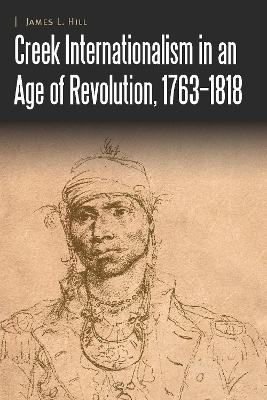
Creek Internationalism in an Age of Revolution, 1763–1818
University of Nebraska Press (Verlag)
978-1-4962-1518-5 (ISBN)
Creek Internationalism in an Age of Revolution, 1763–1818 examines how Creek communities and their leaders remained viable geopolitical actors in the trans-Appalachian West well after the American Revolution. The Creeks pursued aggressive and far-reaching diplomacy between 1763 and 1818 to assert their territorial and political sovereignty while thwarting American efforts to establish control over the region. The United States and the Creeks fought to secure recognition from the powers of Europe that would guarantee political and territorial sovereignty: the Creeks fought to maintain their connections to the Atlantic world and preserve their central role in the geopolitics of the trans-Appalachian West, while the American colonies sought first to establish themselves as an independent nation, then to expand borders to secure diplomatic and commercial rights.
Creeks continued to forge useful ties with agents of European empires despite American attempts to circumscribe Creek contact with the outside world. The Creeks’ solicitation of trade and diplomatic channels with British and Spanish colonists in the West Indies, Canada, and various Gulf Coast outposts served key functions for defenders of local autonomy. Native peoples fought to preserve the geopolitical order that dominated the colonial era, making the trans-Appalachian West a kaleidoscope of sovereign peoples where negotiation prevailed. As a result, the United States lacked the ability to impose its will on its Indigenous neighbors, much like the European empires that had preceded them. Hill provides a significant revisionist history of Creek diplomacy and power that fills gaps within the broader study of the Atlantic world and early American history to show how Indigenous power thwarted European empires in North America.
James L. Hill is a visiting assistant professor of history at the University of Pittsburgh.
List of Illustrations
Acknowledgments
Notes on Terminology
Introduction
1. “Bring Them What They Lack”: Spanish-Creek Exchange and Alliance Making along Florida’s Gulf Coast, 1763–83
2. “Victorious over the Americans in Every Quarter”: Creek Alliances Confronting the American Republic, 1784–88
3. A Voyage “Ill Advised”: A Transatlantic Journey, 1787–91
4. “Come to Populate These Lands”: Competing Political and Diplomatic Visions, 1790–1800
5. “The Voice of the Creeks”: “Prophets’ Men,” Intra- and Inter-talwa Tensions, and Civil War, 1799–1814
6. “Driven to the Desert Lands of the Sea”: The Long Creek War and Diplomacy’s Failure, 1814–18
Epilogue
Notes
Bibliography
Index
| Erscheinungsdatum | 18.05.2022 |
|---|---|
| Reihe/Serie | Borderlands and Transcultural Studies |
| Zusatzinfo | 6 illustrations, 4 maps, 2 tables, index |
| Verlagsort | Lincoln |
| Sprache | englisch |
| Maße | 152 x 229 mm |
| Themenwelt | Geisteswissenschaften ► Geschichte ► Regional- / Ländergeschichte |
| Geschichte ► Teilgebiete der Geschichte ► Kulturgeschichte | |
| Sozialwissenschaften ► Ethnologie | |
| Sozialwissenschaften ► Soziologie | |
| ISBN-10 | 1-4962-1518-4 / 1496215184 |
| ISBN-13 | 978-1-4962-1518-5 / 9781496215185 |
| Zustand | Neuware |
| Haben Sie eine Frage zum Produkt? |
aus dem Bereich


